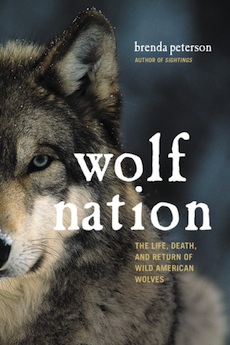By Louis J. Kern
In Wolf Nation Brenda Peterson (ΦBK, University of California-Davis,1972) provides a passionate advocacy for the protection and preservation of the wild wolf population. Her photographic essay, “Wolf Haven: Sanctuary and the Future of Wolves in North America”2016), might well serve as a companion to this work. Peterson describes the often savage policies of predator “management” pursued by Wildlife Services (a branch of the USDA APHIS) that eliminated 384 gray wolves in 2015 supported by a highly motivated, vocal minority of anti-wolf activists comprised of hunters and ranchers. State and federal elimination programs mesh neatly with ultra-right political programs and the broader goals of the Koch brothers—elimination of native species from public lands and transferring title of those lands to private hands to facilitate extractive industry. Ironically, the end result would be to disempower and evict the very anti-wolf advocates so currently active.
Countering these disheartening policies, this volume offers a scientifically grounded, compassionate view of Canus lupus that fully incorporates current understanding of mammalian species and the complexities of ecological balance. Peterson provides humane discussions of individual wolves, families like the Lamar Canyon pack, and broader resettlement ventures like the Yellowstone Wolf Project. In accord with current biological understanding, she underscores the ethical and deep emotional life of animals and in the case of wolves a complex familial structure, often of an extended pattern, that closely parallels our own. From an ecological perspective, she demonstrates that predators do not decimate prey species but rather control their populations, thus ensuring that game animals like deer and elk do not exceed the carrying capacity of their territory. In addition, she effectively counters the popular mythology surrounding wolves—that they are a danger to humans, that they are brutal, indiscriminate killers, that they provide the model for human sexual predators. In the past century, only two people have been killed by wolves, and wolves account for only about one percent of livestock losses annually. The legendary howling of the wolf apparently serves as a means of recognizing kin and cementing bonds of community. Wolves mate for life and apparently have the capacity to control their population in response to changing environmental conditions.
While wolf recovery remains highly uncertain, Peterson is optimistic. Despite the negative forces of entrenched beliefs, misguided governmental policies, and exploitative natural resources practices are powerful threatening forces, recent adoption of non-lethal methods of protecting livestock have been implemented in several states, and the millennial generation overwhelmingly supports the reintroduction of wolves into the wild. A worrying problem remains for wolf advocates—only a single unadulterated species, the gray wolf, remains. The red wolf (Canis lupus rufus) and the eastern wolf (Canis lupus lycaon) are sub-species. Literal interpretation of endangered species protection could exclude these variations. On the positive side, tradition and myth place wolves at the center of human experience, from Romulus and Remus to sacred customs and beliefs of Native Americans to historically documented cases of feral children. Popular cultural forms from Kipling’s Jungle Book to Jean Craighead George’s Julie and the Wolves trilogy (1973-1997) to Jian Rong’s Wolf Totem (2004) underscore the closeness of two apex predators.
For those wishing to become more directly involved with wolf preservation, Peterson provides an appendix of “Organizations Working to Preserve Wild Wolves.” As she concludes, “the pro and anti wolf struggle is a particularly American passion play and identity crisis”; “the wolf nation must survive if we are to make the world wild and whole again.”
Louis J. Kern (ΦBK, Clark University,1965) is professor emeritus of history at Hofstra University. Hofstra University is home to the Omega of New York chapter of Phi Beta Kappa.




